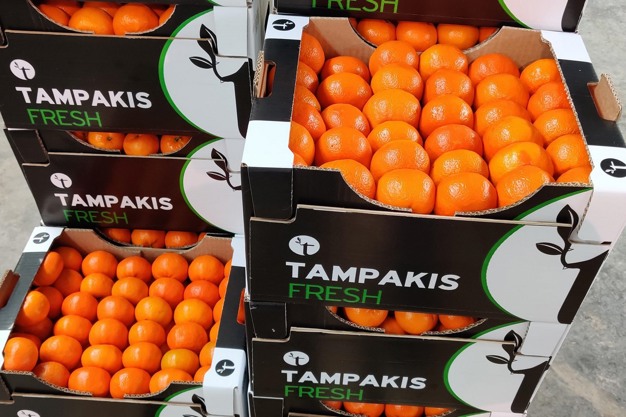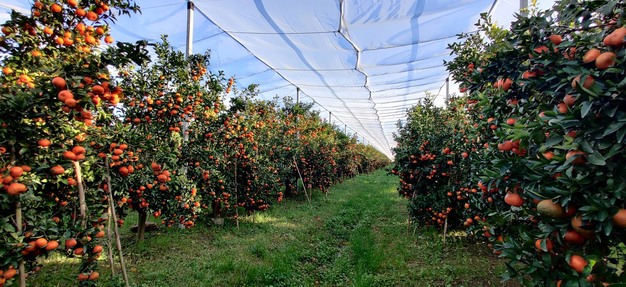Despite a two week delay, the Greek citrus season went quite well up until January, says Spiros Tampakis, owner of Greek citrus exporter Tampakis Fresh: "We had a really good start with the early varieties, even though the weather was quite warm, delaying pick ready maturity by 15 days. Fruit quality and sizes have been good and market demand remained strong, with good prices for both Clementines and Navelinas up to Christmas time. During January things slowed down, due to a sharp fall in demand and an increase of competition from countries outside the EU, such as Egypt, Turkey and Morocco, as these countries offer products at much lower prices. Favourable weather conditions assisted Clementines to remain in good condition up to early February, which led to a drop in prices for Novas, or Clemenvilla, as consumers in most markets prefer Clementines."

At this point, the entrance of competing citrus fruits is having an impact on the European demand, Tampakis explains. "The demand for Lane Late oranges is low at the moment, due to a lack of large sizes and fierce competition from Egypt. On a positive note, orange juice prices in Greece have increased from 8 cents/kg last year to 22 cents this year, thus in the worst case scenario producers could break even on their operating costs. Mandarin production has been the same as the previous season with overall good quality sizes. Orange production is higher this year especially for Lane late but with smaller calibres."
 According to Tampakis, Greece would fare better if they had more varieties to grow and export: "The demand for mandarins is very good but a serious issue is that Greece lacks the varietal diversity of Spain or Italy. Mandarin varieties are limited to Clemenules, Novas, Ortaniques and Page, oranges are mostly Navels, Lane Late and Valencias. Licensed protected varieties are practically non-existent in the Greek citrus industry. This situation presents challenges as well as opportunities since there are growing areas like Etoloakarnania with high soil fertility and abundant water reserves."
According to Tampakis, Greece would fare better if they had more varieties to grow and export: "The demand for mandarins is very good but a serious issue is that Greece lacks the varietal diversity of Spain or Italy. Mandarin varieties are limited to Clemenules, Novas, Ortaniques and Page, oranges are mostly Navels, Lane Late and Valencias. Licensed protected varieties are practically non-existent in the Greek citrus industry. This situation presents challenges as well as opportunities since there are growing areas like Etoloakarnania with high soil fertility and abundant water reserves."
Tampakis states that he's always looking for ways to grow the company, via investments or otherwise. "My company's focus and specialisation is on easy peelers with leaves. We strive to produce high quality mandarins for demanding markets, both in Greece and the EU. Being a third generation agronomist means always seeking new technologies to improve our orchards and new varieties to widen the production calendar. Every year is an investment year for us."
Over the past few years, Tampakis has made several major investments, some larger than others, but all in order to improve the product: "Three years ago, we constructed a permanent net structure on one of our orchards and were blown away by the results in quality. Fruit under nets are seedless, better tasting plus wind, heat and frost stress is minimised. Last year we invested in more net structures and also upgraded our packing line to increase production capacity. This year we are investing in a new orchard of 16Ha, where we will plant Fukumoto oranges and our first Valley Gold trees. Citricom's Valley Gold is a patented mid-season variety that produces a seedless high brix easy peeler of exceptional quality. Valley Gold will close the gap between early and late mandarin varieties replacing Hernandinas and Novas as a better quality fruit."

The fact other origins can produce similar products cheaply, without adhering to the same ruleset as European growers does worry Tampakis. "The major challenge for our industry is the competition from third countries that do not abide by the same socioeconomic rules that EU producers have to attest to. Horticultural input costs such as fertilizers and plant protection products increased dramatically last year. The tractors in Berlin, Paris, Madrid and Athens echo a cry that the ears in Brussels have to listen to and address the issues that farmers have with the current system," he concludes.
For more information:
Spiros Tampakis
Tampakis Fresh
Email: [email protected]
www.tampakisfresh.com
